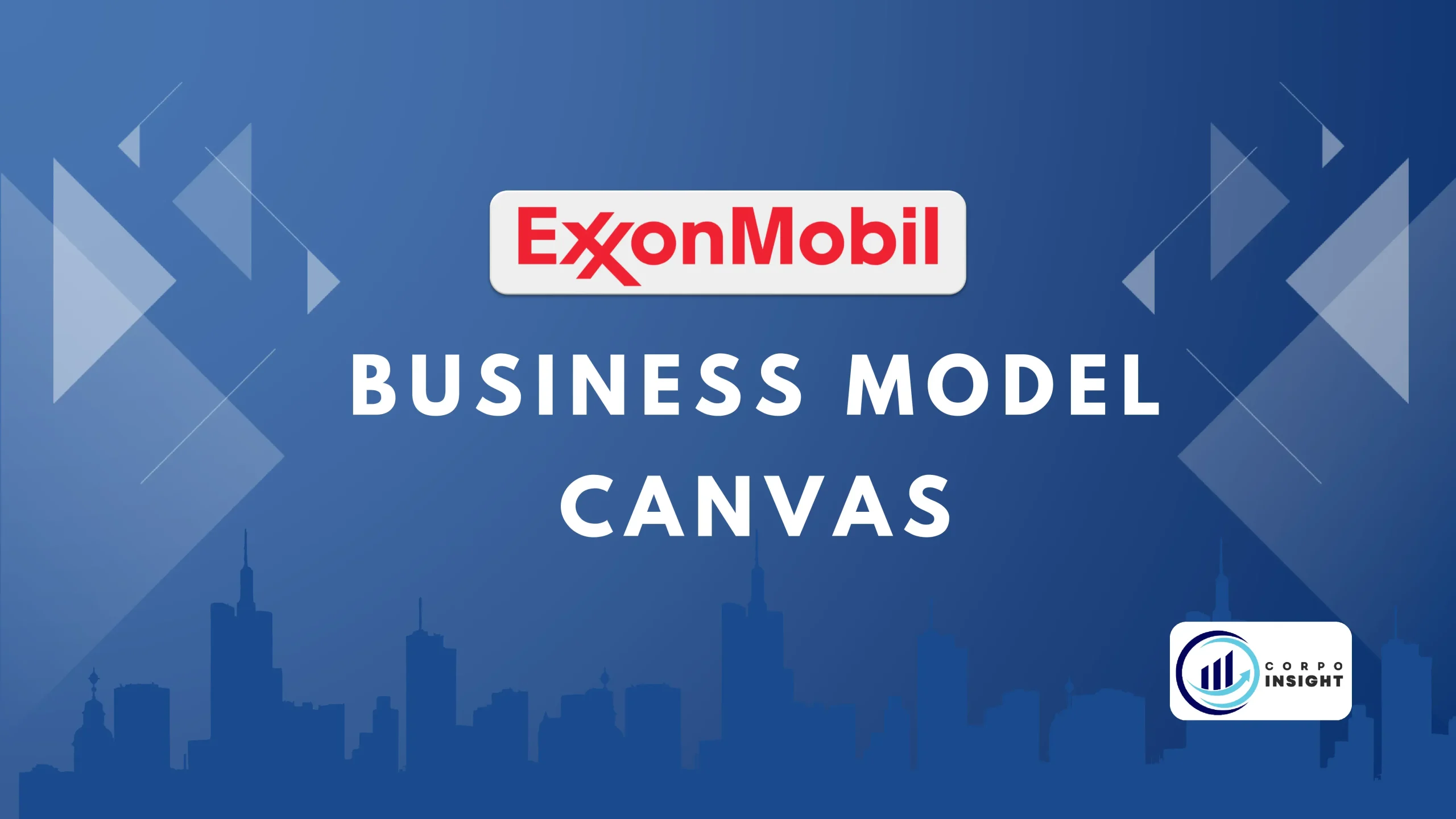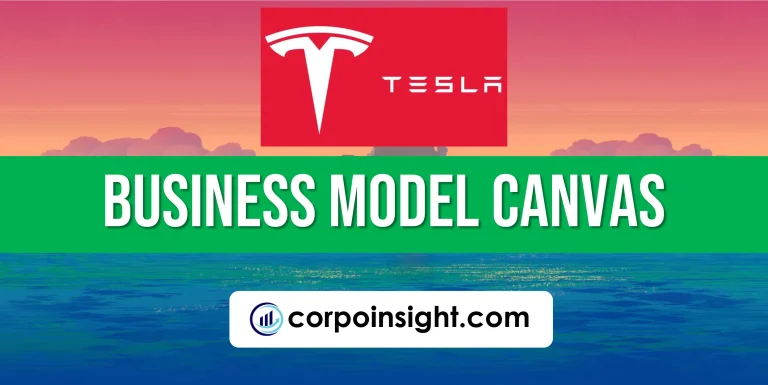ExxonMobil Business Model Canvas 2025
Although ExxonMobil began as separate companies in the late 19th century, the merged energy giant is one of the world’s largest publicly traded oil and gas corporations, with operations spanning from Arctic drilling to renewable energy research. In this ExxonMobil Business Model Canvas, I will identify its customer segments, value proposition, revenue streams, channels, customer relationships, key activities, key resources, key partners, and cost structure.
Interesting fact!
ExxonMobil scientists helped develop the lithium-ion battery technology used in modern electric vehicles, though they ultimately didn’t pursue commercialization.
ExxonMobil Competitors
Chevron | Shell | BP | TotalEnergies | Saudi Aramco | ConocoPhillips | PetroChina | Petrobras | Equinor | Eni
Customer Segments – ExxonMobil Business Model Canvas
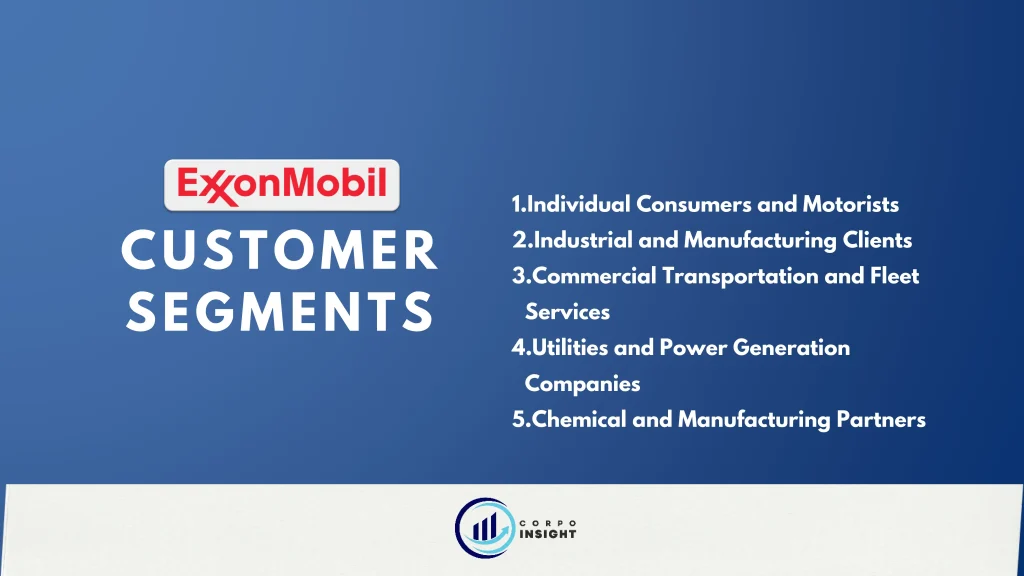
Individual Consumers and Motorists: Through its vast network of approximately 11,500 Exxon, Mobil, and Esso-branded service stations across 100+ countries, ExxonMobil serves millions of everyday consumers who rely on its fuels, lubricants, and convenience store products for daily transportation needs.
Industrial and Manufacturing Clients: Major manufacturers, particularly in aerospace, automotive, and heavy machinery sectors, depend on ExxonMobil’s specialized lubricants and petrochemicals, with companies like Boeing and Toyota utilizing their advanced synthetic oils and industrial fluids for optimal performance.
Commercial Transportation and Fleet Services: ExxonMobil maintains strategic partnerships with logistics companies, airlines, and shipping corporations, providing specialized fuel cards and fleet management solutions while serving industry giants like FedEx and Maersk with marine and aviation fuels.
Utilities and Power Generation Companies: As natural gas becomes increasingly important in the global energy mix, ExxonMobil supplies numerous power generation facilities and utility companies, while simultaneously developing partnerships for carbon capture and storage initiatives to support their sustainability goals.
Chemical and Manufacturing Partners: Through its petrochemical division, ExxonMobil provides essential raw materials and specialized chemicals to diverse industries, ranging from plastic manufacturers to pharmaceutical companies, while continuously innovating sustainable solutions for evolving market demands.
Value Proposition – ExxonMobil Business Model Canvas
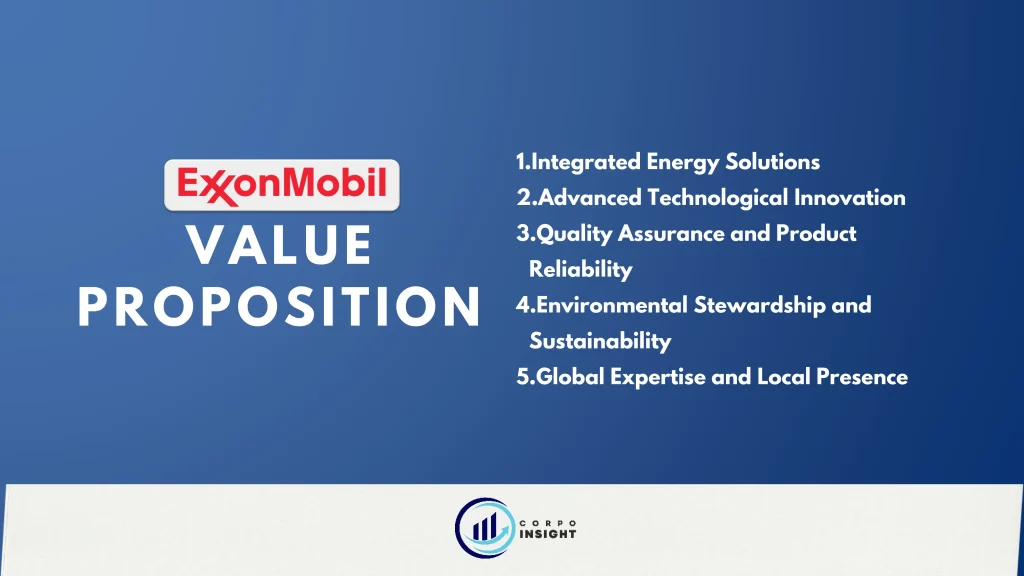
Integrated Energy Solutions: While maintaining leadership in traditional petroleum products, ExxonMobil delivers comprehensive energy solutions through its vertically integrated operations, from exploration to retail distribution, ensuring reliable supply chains and consistent product quality across its global network of operations.
Advanced Technological Innovation: Through significant investments in research and development, reaching $1.2 billion in 2023, ExxonMobil develops cutting-edge technologies like their proprietary Speedpass+™ mobile payment system and next-generation clean energy solutions, including carbon capture and hydrogen production technologies.
Quality Assurance and Product Reliability: ExxonMobil’s commitment to stringent quality control is evident in their Synergy™ fuel technology and Mobil 1™ synthetic oil, which consistently outperforms industry standards, while their global distribution network ensures product availability and consistency.
Environmental Stewardship and Sustainability: Having pledged $15 billion toward lower-carbon initiatives through 2027, ExxonMobil demonstrates its commitment to sustainability through investments in carbon capture technology, biofuels research, and renewable energy projects, addressing growing environmental concerns.
Global Expertise and Local Presence: By combining its worldwide operational expertise with localized market understanding, ExxonMobil delivers tailored solutions while maintaining consistent global standards, supported by its extensive network of research centers and technical facilities across continents.
Revenue Streams – ExxonMobil Business Model Canvas
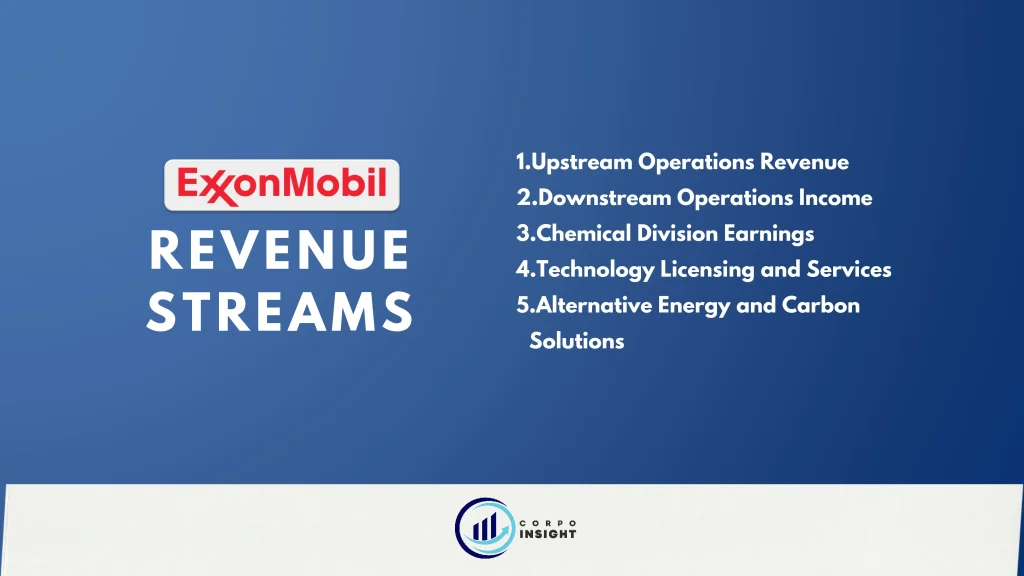
Upstream Operations Revenue: Generating approximately $55.7 billion in 2023, ExxonMobil’s upstream segment derives substantial income from crude oil and natural gas exploration, development, and production activities across strategic locations, including the Permian Basin and Guyana operations.
Downstream Operations Income: Through its extensive network of refineries and retail outlets, ExxonMobil’s downstream segment contributed roughly $42.1 billion in 2023, encompassing revenue from refined petroleum products, gasoline sales, and specialty products like premium lubricants and asphalt.
Chemical Division Earnings: The chemical segment, which manufactures and markets petrochemicals and plastics, generated approximately $21.3 billion in 2023, serving diverse industries from packaging manufacturers to automotive companies with specialized products and solutions.
Technology Licensing and Services: While contributing a smaller portion to overall revenue, ExxonMobil generates significant income through licensing its proprietary technologies, technical services, and engineering expertise to other companies in the energy sector, particularly in refining and petrochemical processes.
Alternative Energy and Carbon Solutions: Though still emerging, revenue streams from low-carbon solutions, including carbon capture technology, hydrogen production, and biofuels, are growing steadily as ExxonMobil expands its presence in the renewable energy sector.
Channels – ExxonMobil Business Model Canvas
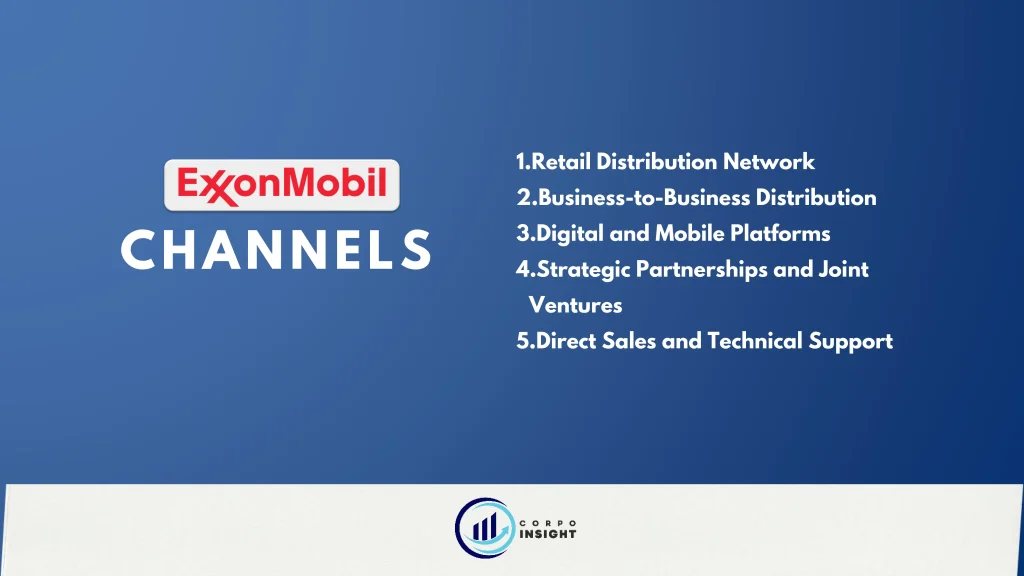
Retail Distribution Network: Operating through 11,500+ branded service stations across 100+ countries, ExxonMobil maintains a strong market presence via Exxon, Mobil, and Esso branded outlets, while implementing digital innovations like the Rewards+™ app that enhances customer experience and loyalty.
Business-to-Business Distribution: Through its dedicated commercial sales teams and specialized distribution centers, ExxonMobil serves industrial clients and wholesalers, utilizing sophisticated supply chain management systems that ensure timely delivery of products ranging from bulk fuels to specialized lubricants.
Digital and Mobile Platforms: Leveraging its digital ecosystem, including the Smart Card™ fleet management system and online customer portals, ExxonMobil facilitates seamless transactions and real-time monitoring capabilities for commercial customers while providing enhanced security features.
Strategic Partnerships and Joint Ventures: ExxonMobil expands its market reach through strategic alliances with local distributors, retailers, and industry partners, particularly in emerging markets where direct operations might face regulatory or logistical challenges.
Direct Sales and Technical Support: Maintaining a global network of technical support centers and direct sales offices, ExxonMobil provides specialized consulting services and product solutions while offering immediate assistance through its 24/7 customer support system.
Customer Relationships – ExxonMobil Business Model Canvas
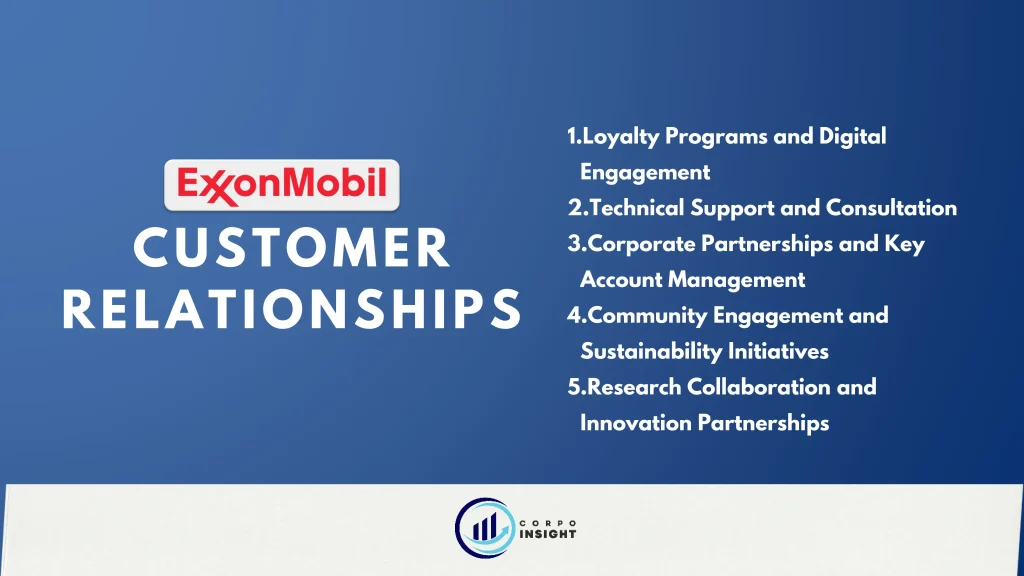
Loyalty Programs and Digital Engagement: Through the innovative Rewards+™ program, which has garnered over 40 million members globally, ExxonMobil cultivates customer loyalty by offering personalized rewards, real-time savings, and seamless payment solutions while continuously enhancing their digital touchpoints.
Technical Support and Consultation: ExxonMobil maintains dedicated teams of technical experts and engineers who provide specialized consulting services to industrial clients, while their Global Service Center offers 24/7 support across multiple languages and channels.
Corporate Partnerships and Key Account Management: Leveraging their dedicated account management teams, ExxonMobil builds long-term relationships with major corporate clients through customized solutions, technical collaboration, and strategic planning sessions that address specific industry challenges.
Community Engagement and Sustainability Initiatives: While investing in local communities through education programs and environmental initiatives, ExxonMobil strengthens stakeholder relationships by maintaining transparent communication about their sustainability efforts and engaging in community feedback sessions.
Research Collaboration and Innovation Partnerships: Through strategic alliances with universities, research institutions, and industry partners, ExxonMobil fosters collaborative relationships that drive innovation while addressing emerging customer needs and environmental challenges.
Key Activities – ExxonMobil Business Model Canvas
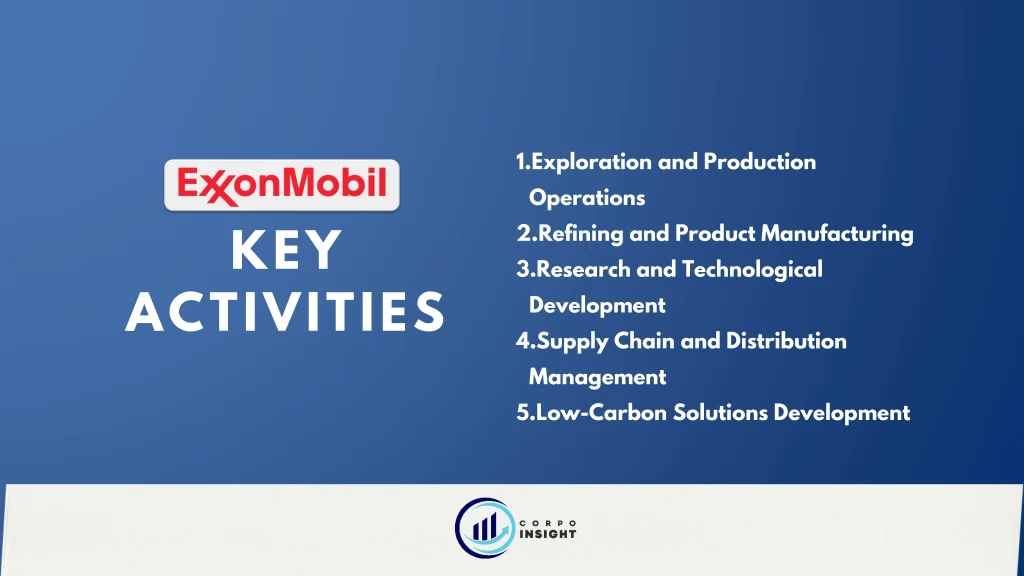
Exploration and Production Operations: Through advanced seismic imaging technology and innovative drilling techniques, ExxonMobil conducts extensive exploration activities in strategic locations like Guyana, where they’ve discovered approximately 11 billion barrels of oil equivalent, while simultaneously optimizing production from existing assets.
Refining and Product Manufacturing: Operating 22 refineries globally with a combined capacity of 4.9 million barrels per day, ExxonMobil transforms crude oil into high-value products, while their integrated manufacturing facilities produce specialized chemicals and lubricants for diverse industrial applications.
Research and Technological Development: Investing over $1.2 billion annually in R&D, ExxonMobil focuses on breakthrough technologies in carbon capture, advanced biofuels, and energy efficiency, while maintaining research partnerships with leading institutions like MIT and Stanford University.
Supply Chain and Distribution Management: Through sophisticated logistics networks and digital tracking systems, ExxonMobil coordinates the movement of products across 100+ countries, while optimizing inventory levels and ensuring timely delivery through their proprietary supply chain management solutions.
Low-Carbon Solutions Development: Having committed $15 billion through 2027, ExxonMobil actively develops and implements carbon reduction technologies, hydrogen production facilities, and renewable energy projects, while expanding its portfolio of sustainable solutions.
Key Resources – ExxonMobil Business Model Canvas
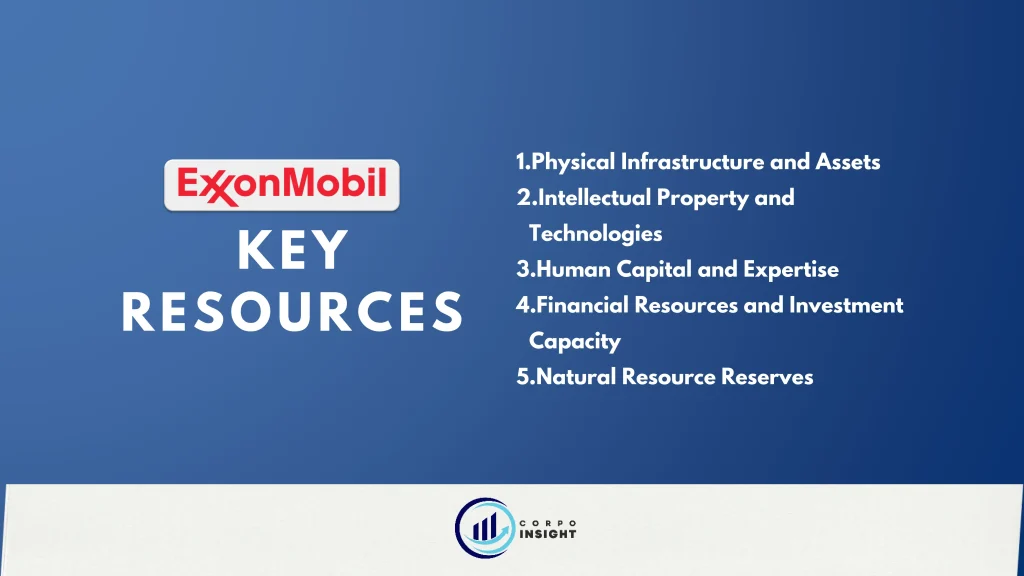
Physical Infrastructure and Assets: With 22 refineries, 11,500+ retail outlets, and vast exploration fields including the prolific Permian Basin, ExxonMobil’s physical assets are complemented by advanced equipment like their state-of-the-art drilling platforms and specialized research facilities across global locations.
Intellectual Property and Technologies: Maintaining over 13,000 active patents and proprietary technologies, including their revolutionary Speedpass+™ digital payment system and advanced reservoir management tools, ExxonMobil consistently leverages its technological innovations while developing new solutions for emerging challenges.
Human Capital and Expertise: Employing approximately 62,000 skilled professionals worldwide, including leading scientists, engineers, and industry experts, ExxonMobil’s workforce represents diverse technical expertise while maintaining high standards through comprehensive training and development programs.
Financial Resources and Investment Capacity: With a robust market capitalization exceeding $400 billion and strong cash reserves, ExxonMobil maintains significant financial flexibility that enables strategic investments in emerging technologies and sustainable solutions while ensuring operational stability.
Natural Resource Reserves: Managing proven reserves of approximately 18.5 billion oil-equivalent barrels across diverse geographical locations, ExxonMobil’s resource portfolio includes conventional oil and gas assets while expanding into renewable and alternative energy sources.
Key Partners – ExxonMobil Business Model Canvas
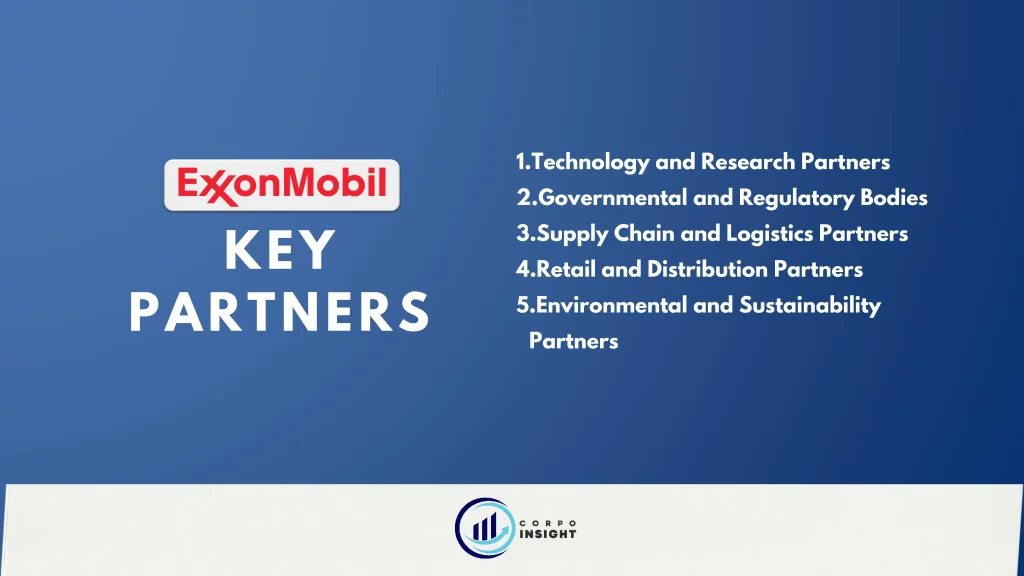
Technology and Research Partners: Through strategic collaborations with institutions like MIT, Stanford, and Princeton, alongside partnerships with innovative companies like Global Thermostat for carbon capture technology, ExxonMobil advances its technological capabilities while accelerating breakthrough developments in sustainable energy solutions.
Governmental and Regulatory Bodies: While maintaining crucial partnerships with national oil companies like Qatar Petroleum and government entities worldwide, ExxonMobil collaborates on major energy projects and policy initiatives, ensuring compliance while contributing to regional economic development.
Supply Chain and Logistics Partners: Strategic alliances with transportation companies, including shipping giants like Maersk and specialized equipment manufacturers, enable ExxonMobil to maintain efficient global operations while optimizing its distribution network across diverse geographical locations.
Retail and Distribution Partners: Through partnerships with convenience store chains, independent dealers, and regional distributors, ExxonMobil extends its retail presence while ensuring consistent product delivery and service quality across its extensive network of branded outlets.
Environmental and Sustainability Partners: Collaborating with environmental organizations and industry consortiums like the Oil and Gas Climate Initiative, ExxonMobil develops and implements sustainable practices while working towards their ambitious carbon reduction goals through shared expertise and resources.
Cost Structure – ExxonMobil Business Model Canvas
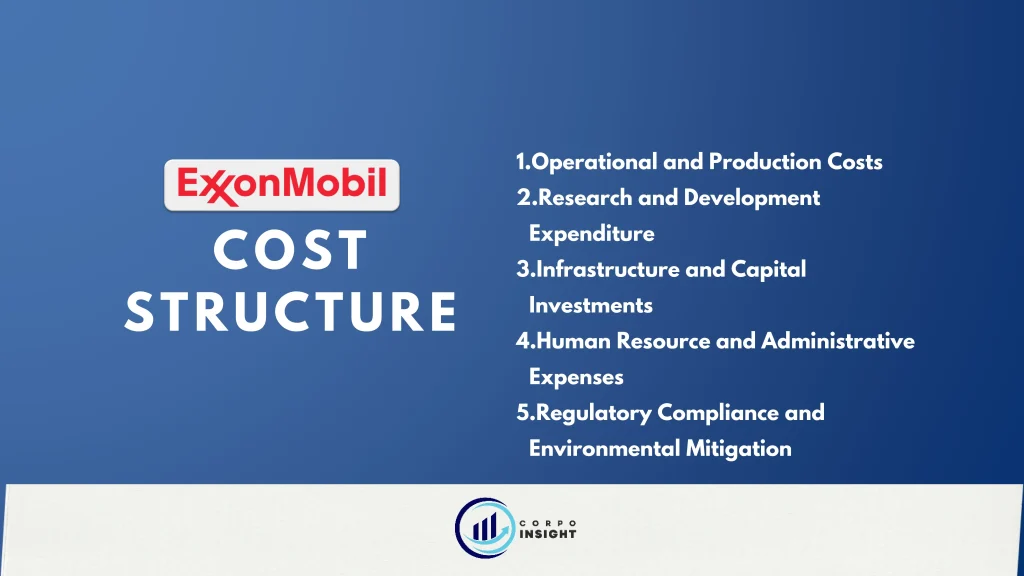
Operational and Production Costs: Managing approximately $35 billion annually in production costs, ExxonMobil invests heavily in drilling operations, facility maintenance, and energy consumption across their global operations, while continuously implementing efficiency measures to optimize operational expenses and reduce waste.
Research and Development Expenditure: With an annual R&D budget exceeding $1.2 billion, ExxonMobil allocates substantial resources to technological innovation, including carbon capture research and sustainable energy solutions, while maintaining state-of-the-art research facilities and supporting its global network of scientists.
Infrastructure and Capital Investments: Committing billions to infrastructure development and maintenance, including $15 billion specifically for low-carbon initiatives through 2027, ExxonMobil continually upgrades refineries, exploration equipment, and distribution networks while expanding its renewable energy capabilities.
Human Resource and Administrative Expenses: Supporting approximately 62,000 employees worldwide involves significant investments in salaries, benefits, training programs, and administrative overhead while maintaining competitive compensation packages to attract and retain top industry talent.
Regulatory Compliance and Environmental Mitigation: Substantial resources are allocated to environmental compliance, safety measures, and regulatory requirements across global operations while investing in advanced monitoring systems and environmental protection initiatives to meet increasingly stringent regulations.
Summary of ExxonMobil Business Model Canvas
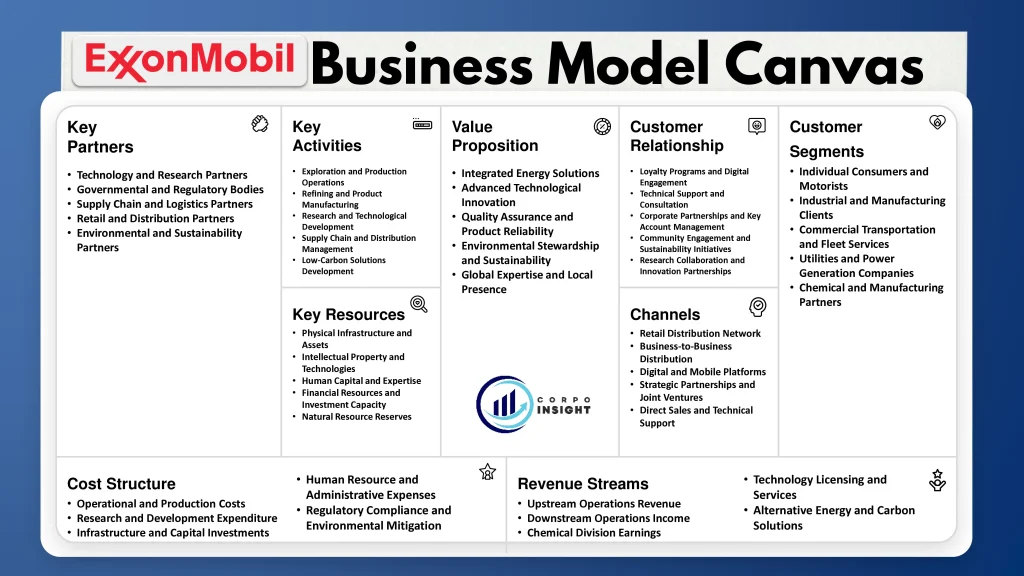
Conclusion on ExxonMobil Business Model Canvas
ExxonMobil’s business model successfully integrates vertical operations from exploration to retail distribution, leveraging extensive physical assets, technological innovation, and global partnerships. While maintaining strong revenue streams from traditional petroleum businesses, the company is strategically pivoting toward sustainable energy solutions with significant investments in low-carbon technologies. This balanced approach enables ExxonMobil to address evolving market demands while maintaining financial stability and pursuing long-term growth opportunities in the changing energy landscape.

I’m Samin Yasar, currently working as a Brand Strategist for one of the world’s leading Prop Firms. I have a passion for content creation and dream of making my own film one day.

